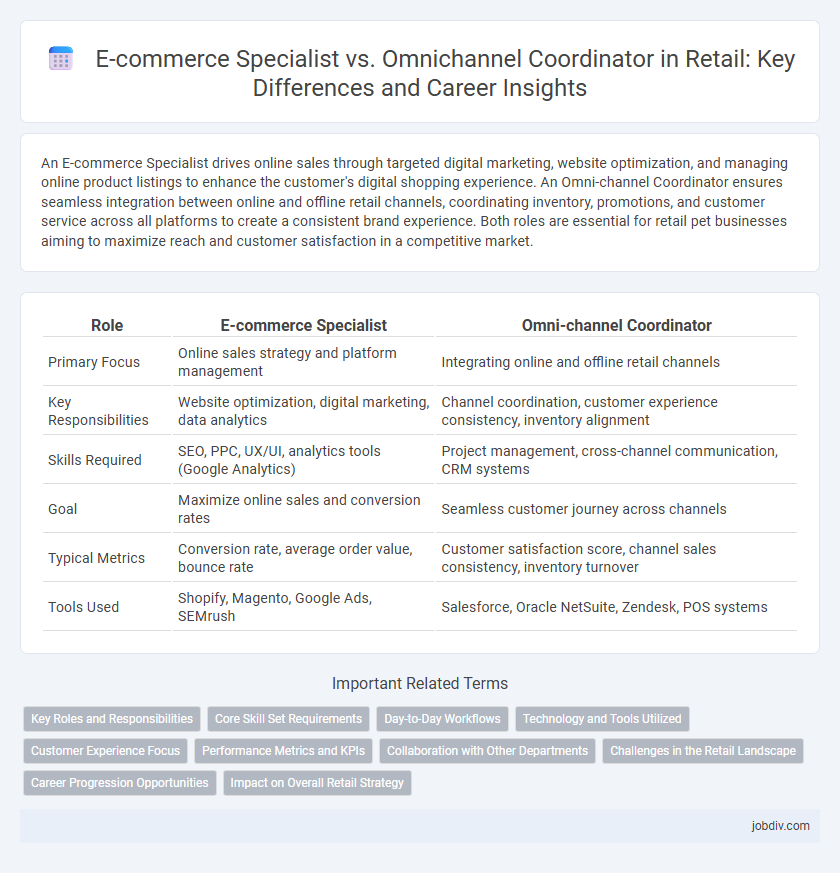An E-commerce Specialist drives online sales through targeted digital marketing, website optimization, and managing online product listings to enhance the customer's digital shopping experience. An Omni-channel Coordinator ensures seamless integration between online and offline retail channels, coordinating inventory, promotions, and customer service across all platforms to create a consistent brand experience. Both roles are essential for retail pet businesses aiming to maximize reach and customer satisfaction in a competitive market.
Table of Comparison
| Role | E-commerce Specialist | Omni-channel Coordinator |
|---|---|---|
| Primary Focus | Online sales strategy and platform management | Integrating online and offline retail channels |
| Key Responsibilities | Website optimization, digital marketing, data analytics | Channel coordination, customer experience consistency, inventory alignment |
| Skills Required | SEO, PPC, UX/UI, analytics tools (Google Analytics) | Project management, cross-channel communication, CRM systems |
| Goal | Maximize online sales and conversion rates | Seamless customer journey across channels |
| Typical Metrics | Conversion rate, average order value, bounce rate | Customer satisfaction score, channel sales consistency, inventory turnover |
| Tools Used | Shopify, Magento, Google Ads, SEMrush | Salesforce, Oracle NetSuite, Zendesk, POS systems |
Key Roles and Responsibilities
An E-commerce Specialist manages online sales platforms, optimizing product listings, analyzing web traffic, and enhancing user experience to boost digital revenue. The Omni-channel Coordinator integrates online and offline retail channels, ensuring seamless customer journeys through inventory synchronization, marketing alignment, and consistent branding across all touchpoints. Both roles require data-driven strategies, but the E-commerce Specialist focuses on digital sales performance while the Omni-channel Coordinator emphasizes unified customer engagement across multiple channels.
Core Skill Set Requirements
E-commerce Specialists require expertise in digital marketing, data analytics, SEO, and platform management to optimize online sales performance. Omni-channel Coordinators must possess skills in supply chain integration, customer experience management, and cross-channel communication to ensure seamless interactions across physical and digital retail environments. Both roles demand proficiency in using CRM and ERP systems but diverge in focus, with e-commerce emphasizing online strategy and omni-channel centering on unified customer journeys.
Day-to-Day Workflows
E-commerce Specialists manage online sales platforms by optimizing product listings, monitoring digital marketing campaigns, and analyzing web traffic to boost conversion rates. Omni-channel Coordinators synchronize customer experiences across physical stores, online shops, and mobile apps, ensuring seamless inventory management and cohesive promotional strategies. Both roles require collaboration with marketing, sales, and logistics teams but differ in workflow focus: digital sales optimization versus integrated multi-channel customer journey management.
Technology and Tools Utilized
E-commerce Specialists primarily utilize platforms like Shopify, Magento, and Google Analytics to optimize online sales, leveraging SEO tools, CRM systems, and digital advertising software to enhance customer acquisition and conversion rates. Omni-channel Coordinators integrate multiple sales channels using unified commerce systems, advanced POS technology, and inventory management software such as Oracle NetSuite or SAP Commerce Cloud to ensure a seamless customer experience across online and offline touchpoints. Both roles depend heavily on data analytics, automation tools, and customer engagement platforms to drive retail performance and operational efficiency.
Customer Experience Focus
An E-commerce Specialist primarily optimizes online shopping platforms to enhance user interface, streamline checkout processes, and analyze digital behavior metrics for improved customer retention. In contrast, an Omni-channel Coordinator integrates multiple sales channels, ensuring a seamless customer experience across physical stores, online platforms, and mobile applications. Both roles prioritize customer experience but differ in scope: the E-commerce Specialist emphasizes digital interactions, while the Omni-channel Coordinator manages unified brand engagement across diverse touchpoints.
Performance Metrics and KPIs
E-commerce Specialists primarily track online sales conversion rates, average order value, and website traffic metrics to optimize digital storefront performance. Omni-channel Coordinators monitor integrated KPIs such as customer retention rates, cross-channel purchase frequency, and unified inventory turnover to ensure seamless customer experiences across physical stores and digital platforms. Both roles rely heavily on data analytics tools to drive revenue growth and improve customer engagement through targeted performance metrics.
Collaboration with Other Departments
E-commerce Specialists collaborate closely with marketing, IT, and logistics teams to optimize online sales channels and improve user experience through data-driven strategies. Omni-channel Coordinators work cross-functionally with inventory management, customer service, and physical store operations to ensure seamless integration between online and offline retail platforms. Both roles require strong communication skills to align objectives and drive cohesive customer engagement across multiple touchpoints.
Challenges in the Retail Landscape
E-commerce Specialists face challenges such as managing online inventory accuracy, optimizing digital marketing campaigns, and ensuring seamless user experiences across various devices to drive online sales. Omni-channel Coordinators must integrate in-store and online operations, synchronize customer data across platforms, and maintain consistent brand messaging to provide a unified shopping experience. Both roles navigate complexities in technology adoption, customer engagement, and supply chain coordination amidst evolving consumer behaviors in the competitive retail landscape.
Career Progression Opportunities
E-commerce Specialists typically advance by deepening expertise in digital marketing, data analytics, and platform management, often moving into roles like E-commerce Manager or Digital Marketing Director. Omni-channel Coordinators have career progression opportunities that emphasize integrating in-store and online experiences, potentially leading to positions such as Omni-channel Manager or Retail Operations Director. Both career paths benefit from increasing proficiency in customer experience optimization, technology integration, and strategic planning to drive retail growth.
Impact on Overall Retail Strategy
An E-commerce Specialist drives online sales growth by optimizing digital storefronts, managing product listings, and leveraging data analytics to enhance user experience and conversion rates. An Omni-channel Coordinator integrates multiple sales channels, ensuring seamless customer interactions across in-store, online, and mobile platforms, which improves brand consistency and customer loyalty. Both roles impact overall retail strategy by balancing digital innovation with unified customer engagement to maximize revenue and market reach.
E-commerce Specialist vs Omni-channel Coordinator Infographic

 jobdiv.com
jobdiv.com